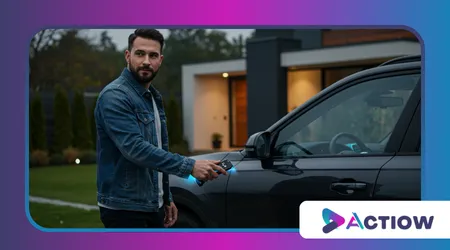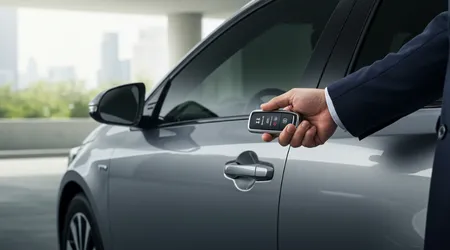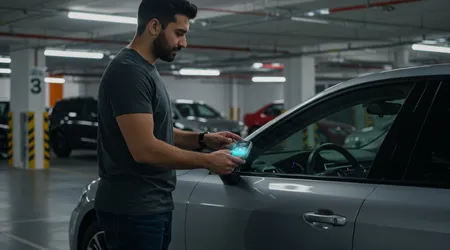Cars with Digital Keys: How They Work and Are They Secure?

Anúncios
Cars with digital keys are revolutionizing how we interact with vehicles in 2025, blending convenience with cutting-edge tech.
Imagine leaving your house, smartphone in hand, and unlocking your car without fumbling for a fob. This isn’t sci-fi it’s reality, driven by automotive innovation.
Digital keys promise ease, flexibility, and a futuristic vibe, but questions linger. How do they function?
Anúncios
Are they truly secure?
Let’s dive into this automotive evolution, exploring mechanics, benefits, and risks, all while keeping it real for curious minds.
The shift to digital keys reflects a broader trend cars becoming extensions of our digital lives. Smartphone apps now replace clunky metal keys, offering seamless access and control.
Automakers like Tesla, BMW, and Kia lead the charge, integrating this tech into everyday driving. It’s not just about convenience; it’s a lifestyle upgrade, appealing to tech-savvy folks.
Yet, as we embrace this change, security concerns bubble up hackers, glitches, and all. This article unpacks the how and why, balancing excitement with a critical eye.
Picture this: you’re late for work, phone buzzing, and your car unlocks as you approach. That’s the magic of digital keys, a blend of software and hardware wizardry.
They’re not just a gimmick they’re reshaping automotive technology for a connected world. But with great power comes great responsibility, and security isn’t a given.
We’ll explore real-world examples, data, and expert insights to see if this tech holds up.
Buckle up for a ride through innovation, practicality, and a few cautionary tales.
What Are Digital Keys and How Did They Start?
Digital keys let you lock, unlock, and start your car using a smartphone, smartwatch, or even a digital wallet.
They emerged in 2017 when Tesla rolled them out with the Model 3, sparking a trend.
Since then, brands like Hyundai and Ford jumped in, refining the concept with each model year.
It’s a shift from physical keys to virtual ones, stored securely on your device, and it’s growing fast think millions of cars by 2030.
The idea sprouted from our reliance on smartphones, merging them with car access for a streamlined experience.
++ Active Safety Systems: Technologies That Prevent Accidents
Early versions used Bluetooth, but 2025 sees ultra-wideband (UWB) and near-field communication (NFC) dominating.
These techs make it precise and quick your car knows it’s you, not some random phone nearby.
ABI Research predicts 60 million vehicles with digital keys by 2031, showing the momentum. It’s not just luxury cars either; mid-range models now offer it too.

How Do Cars with Digital Keys Actually Work?
Unlocking the mystery of cars with digital keys starts with the tech trio: NFC, Bluetooth, and UWB, each playing a role.
NFC works like a tap-to-pay card hold your phone near the door, and it unlocks, simple as that. Bluetooth connects over a short range, letting you start the engine without digging out your device.
UWB, the newest kid on the block, uses precise location tracking, unlocking your car as you walk up.
Setup’s a breeze download the automaker’s app, pair your phone, and voilà, your device becomes the key. Take Kia’s Digital Key 2: it uses UWB for hands-free access, no tapping needed.
You approach, the car senses you, and the door clicks open futuristic, right?
Also read: Cars with Solar Panels: How They Work and Their Advantages
Some systems let you share access via text, perfect for lending your car to a friend, all managed through the app.
Under the hood, it’s a dance of encryption and authentication, ensuring only your phone talks to your car. The app pings the vehicle’s system, verifying your identity with a unique code, all in milliseconds.
If your phone’s battery dies, backup options like NFC cards or PINs kick in smart design for real life.
It’s tech harmony, blending convenience with practicality, but it hinges on robust security.
The Perks of Going Digital: Convenience and Beyond
Why bother with cars with digital keys?
Convenience tops the list lose your fob, no panic, your phone’s got you covered.
Sharing’s a cinch too; send a digital key to your spouse or teen driver without handing over anything physical.
Automakers like BMW let you set limits say, a speed cap for your kid adding control to the mix, all via the app.
Read more: Premium Sound Systems: Which Is the Best for Your Car?
Beyond ease, it’s about integration your car joins your digital ecosystem, syncing with calendars or smart homes.
Picture your Tesla unlocking as you leave a meeting, preheated and ready, thanks to app smarts. Data backs this up: a 2024 Cox Automotive study found 75% of buyers love tech-enhanced shopping experiences, hinting at broader appeal.
It’s not just a key; it’s a lifestyle tweak, cutting clutter and boosting flexibility.
There’s a cool factor too starting your car with a watch feels straight out of a spy flick. Updates over-the-air keep the system fresh, adding features without a dealership trip.
For households juggling multiple cars, one phone handles them all, no keychain chaos.
It’s practical magic, but the real test lies in how it holds up against threats, which we’ll tackle next.
Are Digital Keys Really Secure? The Tech Behind the Shield
Security’s the big question with cars with digital keys can they outsmart hackers in 2025’s connected world?
The tech leans on encryption, like AES-256, a military-grade standard, locking data tight.
UWB adds a layer, using time-of-flight measurements to thwart relay attacks where thieves amplify signals to trick your car. NFC requires close proximity, cutting remote risks.
Yet, no system’s bulletproof Bluetooth’s had hiccups, with researchers cracking weaker setups in lab tests years back.
Modern systems counter this with rolling codes, changing with each use, making intercepts useless.
A 2023 study by ABI Research noted UWB’s edge in premium cars, slashing theft odds versus older tech. Still, phone hacks or app flaws could expose weak spots, demanding constant updates.
Real-world wins exist Tesla’s digital key system has dodged mass breaches, thanks to tight integration and vigilance.
Compare that to keyless fobs, nabbed by relay attacks in droves pre-2020, and digital looks solid. But if your phone’s stolen, all bets are off unless biometrics like fingerprint locks kick in.
It’s a cat-and-mouse game, tech versus thieves, and so far, the edge tilts to innovation.
The Risks: What Could Go Wrong?
Nothing’s perfect, and cars with digital keys face real-world hiccups think tech glitches or human slip-ups.
Phones die imagine a drained battery stranding you, no backup in sight, a rare but rude wake-up call.
Software bugs hit too; a 2024 Ford app glitch locked users out for hours, sparking online gripes. Dependency on tech means one failure can stall your day.
Hackers loom large steal your phone, crack your PIN, and they’re in, no hotwiring needed.
Relay attacks, though tougher with UWB, still nag older Bluetooth setups, especially in budget models.
Data breaches spook too; if an automaker’s server gets hit, your key’s blueprint could leak unlikely, but not impossible.
User error adds spice share a key carelessly, and you’re begging for trouble.
Stats paint a picture: car thefts dropped 10% in tech-heavy markets by 2024, per Interpol, hinting digital keys deter old-school crooks.
Yet, cybercrime’s up 15% new battlegrounds, new risks. It’s not doom and gloom, just a nudge to stay sharp lock your phone, update your apps, and keep a spare plan handy.
Security’s strong, but vigilance seals the deal.
Comparing Digital Keys to Traditional Fobs: A Quick Breakdown
Let’s stack cars with digital keys against old-school fobs how do they measure up in 2025? Table 1 lays it bare: convenience, cost, and security, side by side.
Digital wins on ease no fumbling, just your phone and sharing’s a tap away, unlike fobs needing a hand-off.
Fobs fight back with simplicity; no app, no updates, just press and go.
| Feature | Digital Keys | Traditional Fobs |
|---|---|---|
| Convenience | High—phone-based | Moderate—physical |
| Cost | App free, subs $20/yr | One-time $50-$200 |
| Security | Encryption, UWB | Basic RF, relay risk |
| Backup | NFC card, PIN | Spare key |
Security’s a toss-up digital’s got fancy tech, but fobs dodge cyber threats by staying offline.
Cost-wise, fobs are a one-time buy; digital might nick you with fees BMW charges $20 yearly post-trial. Practicality?
Digital’s sleek until your phone crashes; fobs don’t care about battery life.
It’s trade-offs tech allure versus trusty basics.
| Use Case | Digital Keys | Traditional Fobs |
|---|---|---|
| Sharing | Instant via app | Physical hand-off |
| Tech Dependency | High—phone, app | Low—standalone |
| Theft Risk | Cyber, phone loss | Relay attack |
| Cool Factor | Sky-high | Nostalgic charm |
Daily grind favors digital walk up, unlock, drive, no fuss, all flair.
Fobs shine for luddites or spotty signal zones rural folks, take note. Theft’s the kicker: digital leans on your phone’s defenses; fobs fall to signal grabs if unshielded.
Pick your poison 2025’s a split road, and both have their fans.
Real-World Examples: Digital Keys in Action
Ever wondered how cars with digital keys play out in real life?
Meet Ana, a São Paulo mom juggling work and kids she swears by her Kia EV9’s digital key.
Mornings, she grabs her phone, doors unlock as she nears, no digging through her bag, and off she goes. Sharing with her husband?
A quick app tap, and he’s set smooth as silk.
Then there’s Jake, a Seattle techie with a Tesla Model Y his phone’s his key, his watch his backup, pure sci-fi vibes.
He brags about remote start from his office, car warm before he steps out, all via the app.
Glitches?
Rare, but a 2024 Tesla outage left him stranded thankfully, a reboot fixed it. Real users, real stakes digital keys shine, with hiccups as the exception.
The Future: Where Are Digital Keys Headed?

Peering into 2025 and beyond, cars with digital keys are set to soar think biometrics and broader reach, not just premium rides.
Fingerprint or face scans could lock your phone-key combo tighter, cutting theft risks Hyundai’s testing it now. ABI Research sees 60 million cars by 2031, and mid-range brands like Toyota are piling in, not just the luxe crowd.
Imagine this: your car knows you by voice, adjusts seats, and syncs with your smart home all via digital key tech.
Subscriptions might bloom pay for perks like remote diagnostics or extra shares, a revenue stream for automakers. Risks?
Cyber threats evolve, but so do defenses UWB’s just the start. It’s a connected future, blending cars into our digital fabric, for better or worse.
Scalability’s the buzzword cities like Woven City in Japan test digital keys in smart grids, syncing cars with urban life.
Picture renting a car, key beamed to your phone, no counter hassle Mobility-as-a-Service loves this. Privacy nags, sure, but convenience might win out.
Tech’s racing ahead, and digital keys are steering the wheel expect bumps, but the road’s wide open.
Wrapping Up: Are Digital Keys Worth It?
So, are cars with digital keys the future or a flashy fad?
They’re a game-changer convenience, sharing, and tech appeal scream yes, loud and clear.
Security’s robust encryption and UWB keep thieves at bay, outpacing fob flaws most days. Risks like phone loss or glitches?
Real, but manageable with backups and smarts 2025’s tech isn’t fumbling blind.
Reflect on Ana and Jake everyday folks thriving with digital ease, glitches rare, benefits loud.
Data backs it: theft’s down, adoption’s up, and 75% of buyers crave tech per Cox Automotive. It’s not perfect cyber threats lurk, costs might sting but the edge leans positive.
For the curious, the connected, it’s a no-brainer: digital keys deliver, blending practicality with a futuristic kick.
Zoom out: this isn’t just about keys it’s cars morphing into smart devices, syncing with our lives. Security holds if you play it sharp lock your phone, update your app, stay ahead.
Fobs still charm the simple souls, but digital’s the pulse of 2025 convenient, cool, and mostly safe.
Dive in, eyes open, and enjoy the ride it’s your call, and the road’s yours to take.
